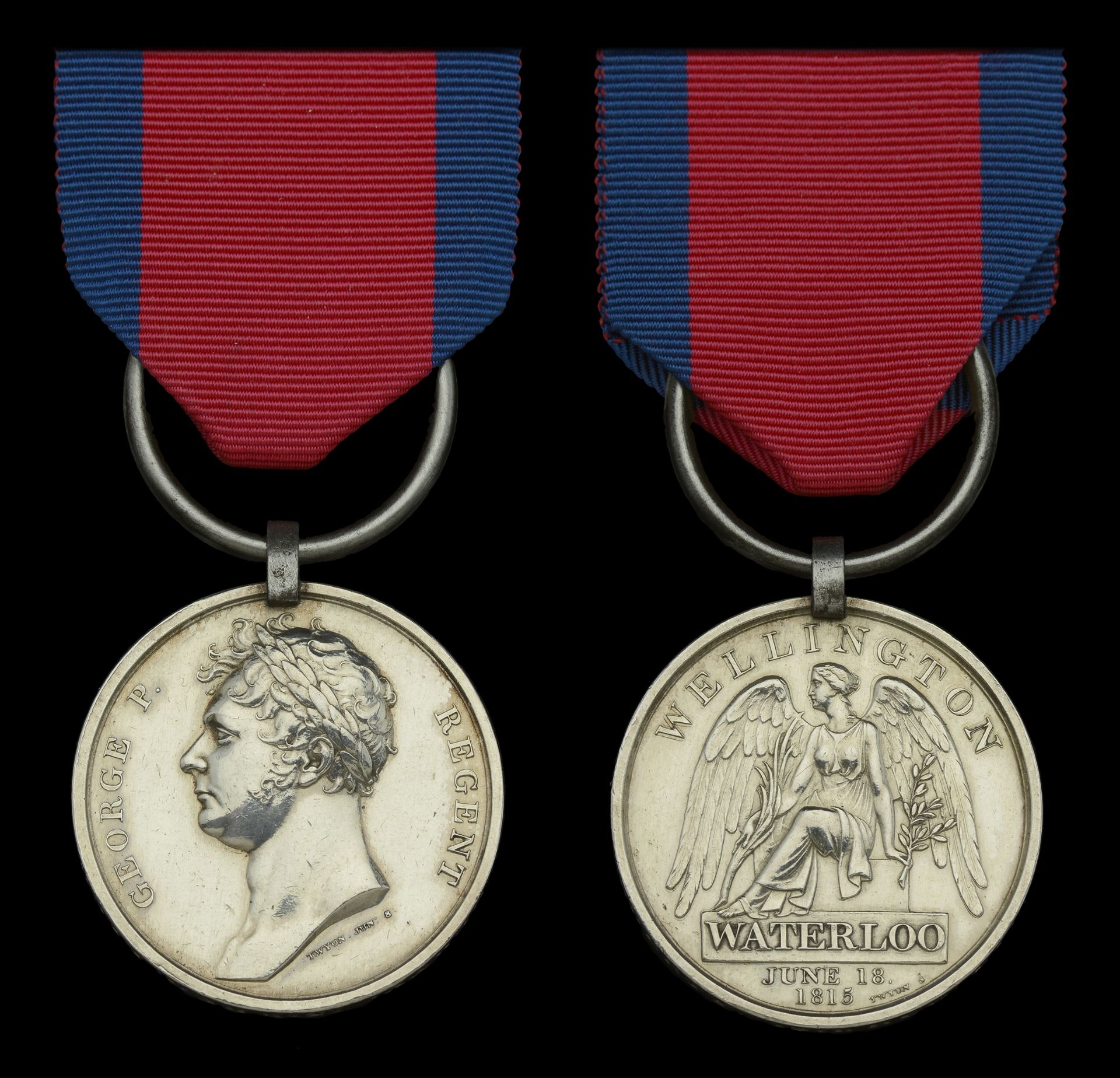The Waterloo medal awarded to Colonel Patrick Doherty, C.B., K.C.H., who commanded the 13th Light Dragoons at Vittoria and for the remainder of the war in the Peninsula, receiving a gold medal for Vittoria and a clasp for Orthes; he was present in the Waterloo campaign until 18 June 1815, when he had a severe attack of yellow fever, a legacy of his campaigning in the West Indies Waterloo 1815 (Lieut. Col. Doherty, 13th Reg. Light Dragoons.) fitted with original steel clip and ring suspension, nearly extremely fine £8,000-£10,000 --- Patrick Doherty was appointed Cornet in the 13th Light Dragoons on 15 April 1794; Lieutenant, September 1794; Captain, 30 April 1795; Major, 6 April 1800; Brevet Lieutenant-Colonel, 25 April 1808; Lieutenant-Colonel, 11 June 1813; Brevet Colonel, 4 June 1814. Doherty saw service first when he sailed with his regiment for the West Indies in February 1796. He was then a Captain, and of the fourteen commissioned officers who sailed with him, he and three others alone were spared by yellow fever to return home. His relative Cornet Doherty died. He served in the Peninsula from April 1810 to July 1811, and from April 1812 to April 1814, and was in command of “D” Cavalry Brigade in March and April 1814. He was present at the actions of Campo Mayor, Alba de Tormes, Vittoria, Nivelle, Nive, Garris, Orthes, Aire, Tarbes, St Gaudens and Toulouse, being in command of the regiment in all these battles for which he received the Gold Medal for Vittoria and Bar for Orthes. In his History of the XIII Hussars, published in 1911, C. R. B. Barrett describes the active part played by the 13th in the action at St Gaudens: ‘The Thirteenth shared with their old comrades of the “ragged brigade,” the gallant Fourteenth, in the advance-duties of the army, which brought them repeatedly into collision with the enemy. On the 22nd of March, as three troops of the Thirteenth Light Dragoons, commanded by Lieut.-Colonel Patrick Doherty, with Major Boyse, Captain Macalister, Lieutenants Doherty, Drought, and Lawrence, and Brigade-Major Dunbar, approached St. Gaudens, four squadrons of French cavalry were discovered drawn up in front of the town. Undismayed by the superior numbers of the enemy, the Thirteenth advanced to the charge, and such was the ardour and determined bravery with which they rushed upon their numerous opponents, that the French horsemen were overthrown at the first shock, and they galloped in disorder through the streets; but they rallied at the other side of the town, and prepared to resist the few British troopers whose audacity they were desirous to punish. The Thirteenth being supported by the Third Dragoon Guards, dashed through the town, and rushing sword in hand upon the French squadrons, broke them in an instant, and pursued them for two miles, cutting many down, and taking above a hundred prisoners, and sixty horses. The ground was covered with cavalry equipments, arms, and dead and wounded men and horses. The conduct of the Thirteenth was highly commended in Major-General Fane's report of this action; the officers and soldiers were also thanked in orders by Lieut.-General Sir Rowland Hill, and the signal gallantry evinced by Captain James Macalister, who commanded the advance on this occasion, was rewarded with the rank of major in the army. The Thirteenth nobly upheld, on this occasion, their well-earned fame as bold horsemen and dextrous swordsmen; and, by their promptitude in rushing to the attack, showed that they possessed the true spirit of good cavalry, adding another to the many proofs they had already given of the insufficiency of the mere preponderance of superior numbers to resist the shock of a determined charge.’ The editor of the Military Calendar states that ‘on Waterloo Day Col. Doherty was lying ill at Brussels, suffering from a most severe attack of West Indian fever and ague; but as it is probable that he took part in the operations of the 16th or 17th June, it does not debar him from being added to the roll of Waterloo officers. He undoubtedly received the medal for Waterloo...’ (Waterloo Roll Call refers). Doherty received the C.B. in June 1815 and commanded the 13th in the Army of Occupation. On 13 January 1835 he was nominated and appointed a Knight Commander of the Royal Hanoverian Guelphic Order, and Knighthood was conferred on him by William IV, at a full levee held at St. James’s Palace on 24 June 1836. The Colonel retired from the service on 8 December 1818 and died at Bath on 20 January 1837. He sadly outlived his two sons, Joseph and George, who had served with their father throughout both campaigns, and were both wounded in the battle on the 18th. Joseph Doherty was a Captain in the battle and died shortly afterwards at Bangalore on 12 June 1819. George Doherty was a Lieutenant in the battle and, according to the Waterloo Roll Call, ‘was severely wounded in the head at Waterloo, and was struck by a ball which was stopped and flattened by the interposition of his watch. He had taken out his watch to remark the time when the regt. was ordered to advance; and not being able to return it, he put it into the breast of his jacket, and thus providentially his life was saved.’



